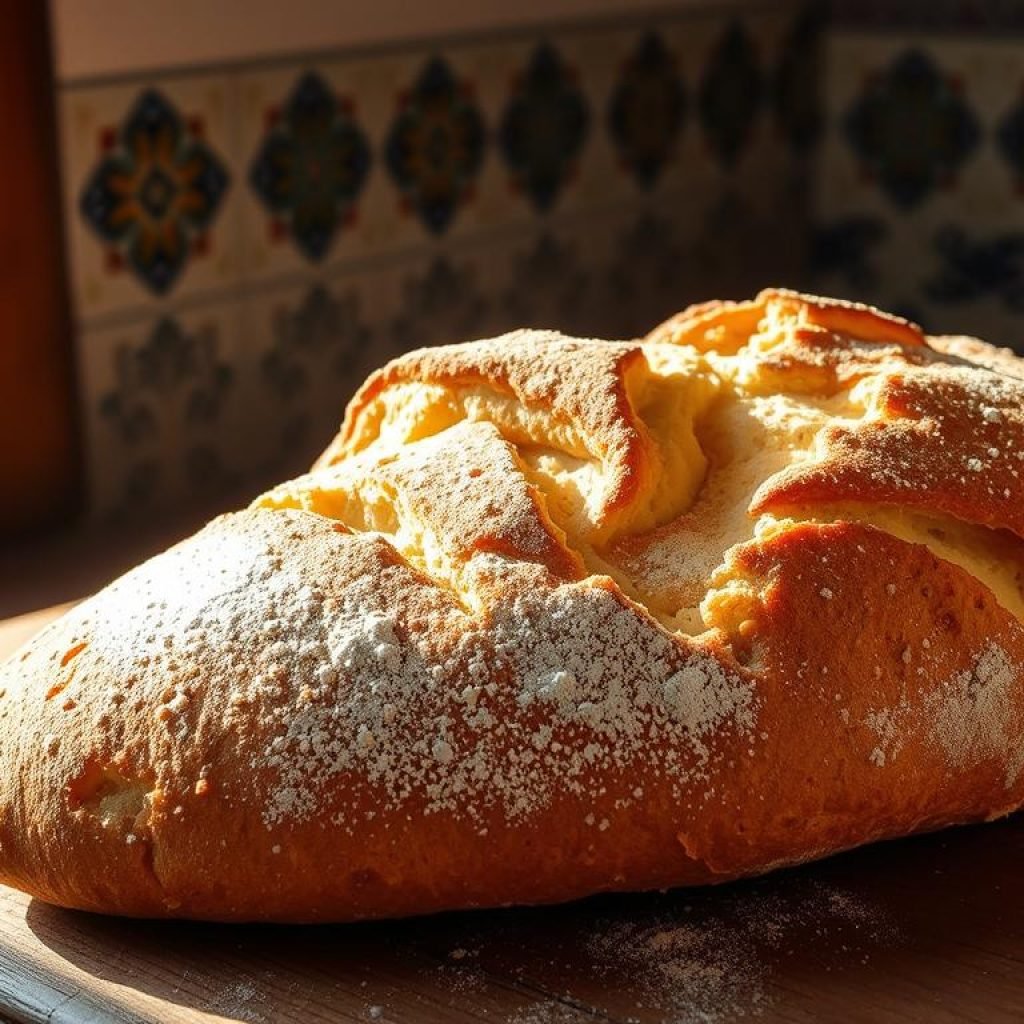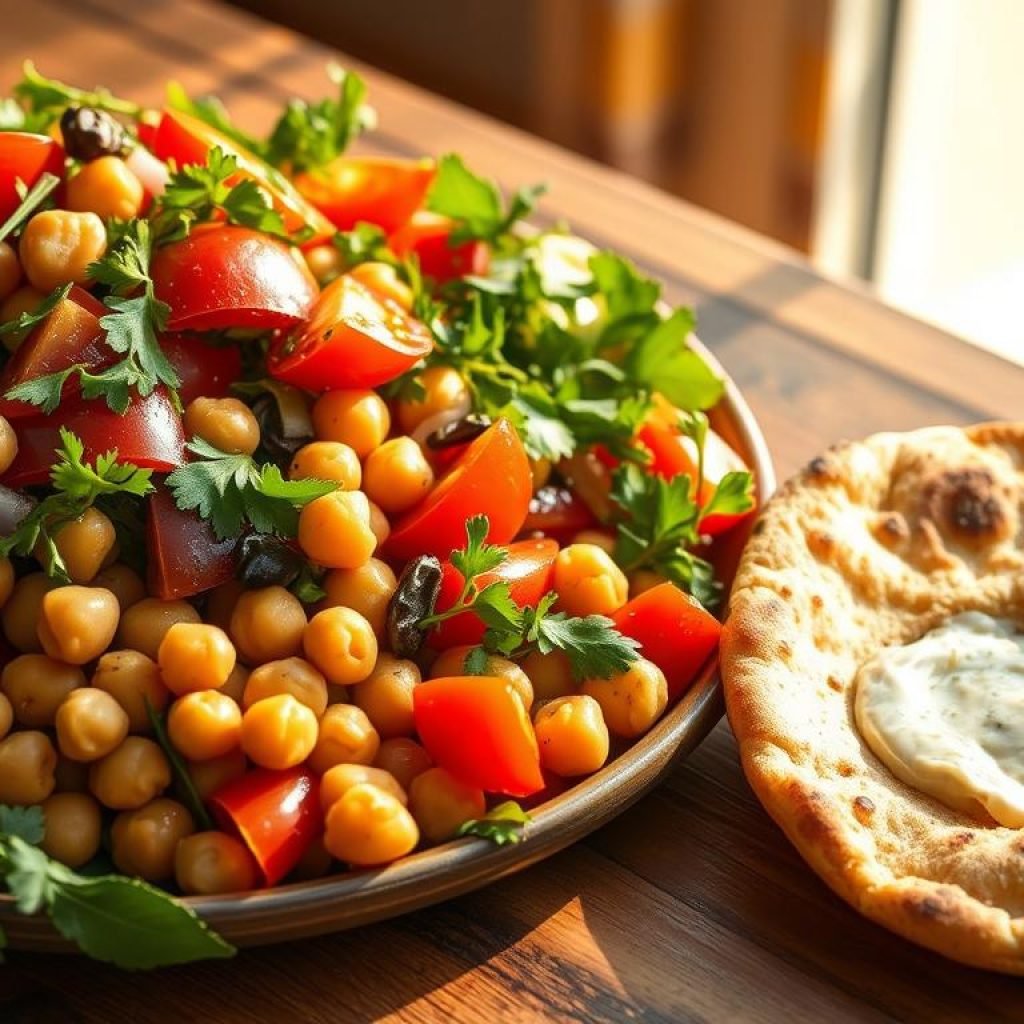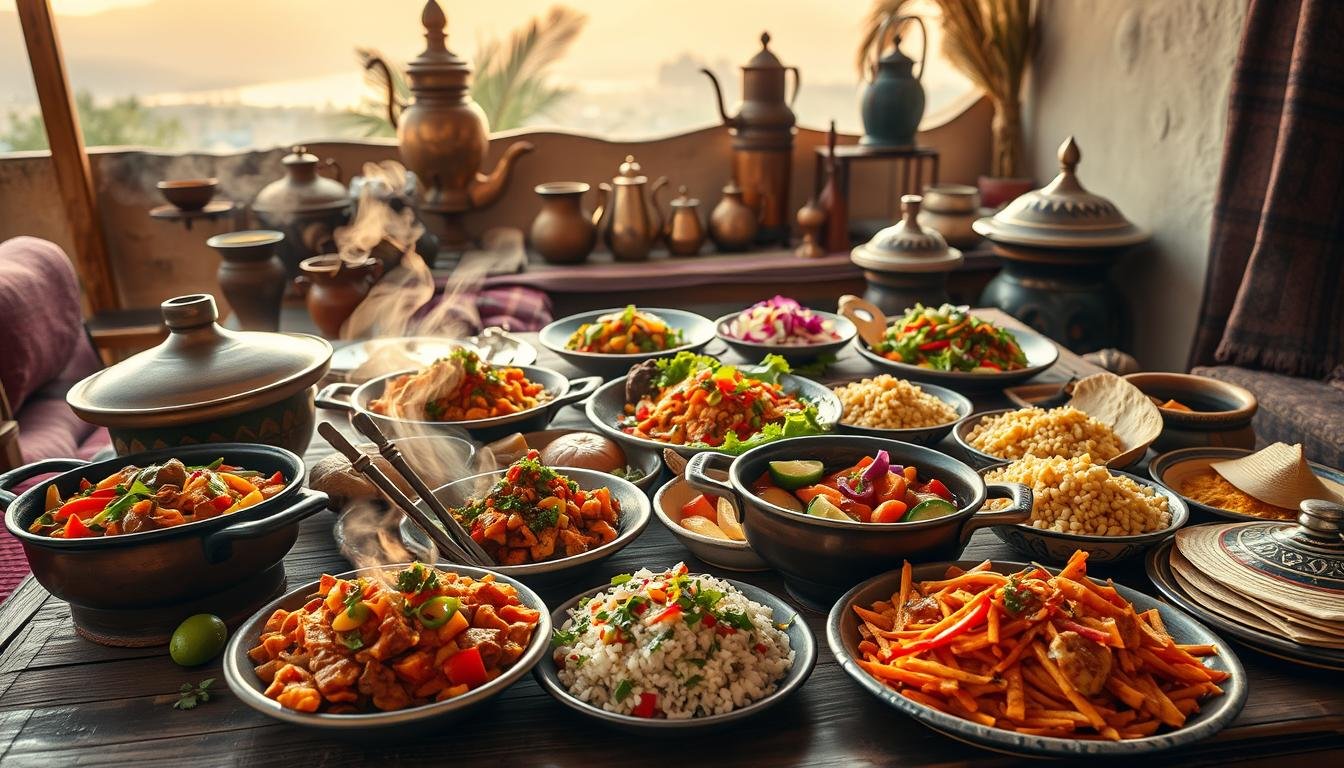Can a country known for animal cruelty still welcome vegetarian food lovers? Morocco, with its rich Moroccan cuisine, is a surprising gem for vegetarians. It offers a variety of tasty and traditional dishes. From flavorful tagines to hearty couscous, Moroccan food is a mix of Mediterranean, Arabic, Berber, and Andalusian flavors, perfect for vegetarians.
Introduction to Vegetarian Food in Morocco
Moroccan cuisine is famous for its bold flavors and aromas, and vegetarian food is no different. With more vegetarian restaurants popping up, Morocco is becoming a top spot for veggie travelers. But what makes Moroccan cuisine great for vegetarians, and how can you enjoy your culinary journey in this beautiful country?
Why Morocco is Great for Vegetarians
Moroccan cuisine has a wide range of vegetarian dishes, from traditional tagines and couscous to tasty salads and soups. It focuses on local and organic produce, making it a healthy and flavorful choice for vegetarians. But how do you find the best vegetarian options in Morocco?
Key Takeaways
- Moroccan cuisine offers a wide range of vegetarian dishes, including traditional tagines and couscous
- Vegetarian restaurants and options are increasingly available in major cities like Marrakech and Fes
- Moroccan cuisine is influenced by multiple cultures, including Mediterranean, Arabic, Berber, and Andalusian
- Traditional Moroccan dishes like taktouka and zaakook are vegetarian-friendly and delicious
- Many vegetarian dishes may not be listed on menus, but can be requested
- Moroccan cuisine is a great option for vegetarians looking for healthy and flavorful food
Introduction to Vegetarian Food in Morocco
Moroccan cuisine is famous for its rich flavors and aromas. Vegetarian food plays a big role in it. The mix of Arab, Berber, and Mediterranean influences brings a wide variety of vegetarian options. Traditional flatbread is a staple, often served with meals or used as a base for dishes.
In Morocco, the vegan scene is growing fast. Many restaurants now offer vegan options. The country’s Mediterranean climate means fresh vegetables are available all year.
Why Morocco is Great for Vegetarians
Moroccan cuisine offers a rich variety of vegetarian options. There’s a big focus on plant-based dishes. You’ll find vegetarian Tagine and vegetable Couscous, each with its own twist based on local ingredients and traditions.
The Influence of Culture on Moroccan Cuisine
Moroccan cuisine is shaped by Arab and Berber traditions, with Southern European influences. The traditional Berber diet includes lamb, vegetables, and dairy, seasoned with spices like cumin and turmeric. Moroccan bread is a key part of meals, adding flavor and texture to the dining experience.
Traditional Moroccan Dishes That Are Vegetarian
Moroccan cuisine is famous for its rich flavors and aromas. Many traditional dishes are naturally vegetarian. Couscous is a staple, often served with vegetables and legumes. The art of North African baking is seen in homemade bread, served with meals.
Some popular vegetarian dishes in Morocco include:
- Couscous with vegetables and legumes
- Tagine with a variety of vegetables and dried fruits
- Harira, a nutritious soup made with lentils and vegetables

These dishes are not only delicious but also show the diversity of Moroccan cuisine. With a focus on homemade bread and North African baking, Moroccan cuisine offers a unique and flavorful experience for vegetarians.
Popular Vegetarian Street Food in Morocco
Moroccan street food is tasty and cheap. It’s a great way to try local dishes. Vegetarians can enjoy sfenj, which are like Moroccan doughnuts. They’re often served with coffee or tea.
These sweet treats are perfect for breakfast. They show how rich Moroccan food can be.
For savory dishes, try brochettes. These are grilled vegetable skewers. They include tomatoes, peppers, and onions. They’re served with bread, which is great for trying new bread recipes.
- Sfenj: Moroccan doughnuts
- Brochettes: Grilled vegetable skewers
- Mssemen: A filled pancake that can be vegan-friendly
- Baghrir pancakes: Characterized by their surface covered in tiny holes, which help to catch sauces
These dishes show the variety and richness of Moroccan food. They’re a great way to experience local culture. Whether you want something sweet or savory, Moroccan street food has it all.
Must-Try Salads and Sides
Moroccan cuisine is known for its diverse and flavorful salads. These salads are often served as sides to complement the main dishes. The Moroccan carrot salad is a favorite, made with grated carrots, onions, garlic, and spices.
Zaalouk, a smoky eggplant salad, is another favorite. It’s seasoned with garlic, paprika, cumin, and chili powder. These salads are often served with authentic Moroccan bread, like Berber bread, for dipping.
Moroccans often choose a variety of cooked vegetable salads as sides. These can include zucchini, bell peppers, tomatoes, and cucumbers. They’re dressed with olive oil, lemon juice, and spices, served at room temperature.
To complete the meal, a warm baguette of Berber bread is always welcome. It’s perfect for sopping up juices and sauces.

- Moroccan carrot salad with raisins and pine nuts
- Zaalouk with smoked eggplant and garlic
- Grilled vegetable skewers with a side of couscous
- Harira soup with a swirl of olive oil and a sprinkle of parsley
Whether you’re in the mood for something light or hearty, Moroccan salads and sides have it all. Try these delicious dishes with a warm loaf of authentic Moroccan bread or Berber bread for a true Moroccan experience.
The Role of Spices in Moroccan Vegetarian Dishes
Moroccan cuisine is famous for its deep flavors, thanks to spices. In vegetarian dishes, spices add warmth and depth. Cumin, coriander, and cinnamon are key spices used. They mix with others to make special blends like Ras el Hanout, which has over 20 spices.
In artisan baking, spices make Moroccan bread taste unique. Spices, herbs, and other ingredients blend to create Moroccan flavors. Common baking spices include cumin, ginger, and turmeric.
Spices are essential in vegetarian cooking. Finding the right mix of flavors is key. A little cumin, cinnamon, or paprika can make a dish special. Here are tips for using spices in vegetarian cooking:
- Begin with a basic mix like cumin, coriander, and cinnamon. Then, add more spices as you like.
- Try different spice mixes to find your favorite flavors.
- Feel free to add a bit of spice, even if it’s not usual.
Where to Find Vegetarian Restaurants in Major Cities
Exploring Moroccan cuisine in cities like Marrakech, Fes, and Chefchaouen is exciting. These places have many vegetarian food options. Marrakech, in particular, has a lot of vegetarian restaurants.
In Marrakech, you can try vegetarian versions of traditional dishes. Think vegetarian couscous, tajine, and harira. Places like Amal Women’s Training Center, Earth Café, and Nomad have great vegetarian choices. Prices vary, but a meal at a cute cafe can be between 60 Dirhams ($6.00) and 70 Dirhams ($7.00). A vegetarian couscous at Nomad is about 140 Dirhams ($14.00).
Fes and Chefchaouen also have plenty of vegetarian options. Fes offers dishes like B’ssara and Couscous. Chefchaouen mixes Moroccan and international flavors. Cafe des Epices, Broc the Kasbah, and World Storytelling Cafe are some top spots. They offer vegetarian dishes at good prices.
Some popular vegetarian dishes include:
- Vegetarian couscous
- Vegetarian tajine
- Harira (chickpea soup)
- Falafel bowl
- Vegetarian pastilla
Morocco’s big cities are a paradise for vegetarian food lovers. You’ll find both traditional and international dishes. Whether you’re in Marrakech, Fes, or Chefchaouen, you’ll enjoy a tasty Moroccan cuisine experience.
Cooking Classes for Vegetarian Travelers
Vegetarians can dive into Moroccan cuisine through cooking classes. Many schools in Morocco offer classes for vegetarians. Here, you can learn to make dishes like traditional flatbread and North African baking specialties.
La Maison Arabe in Marrakech, Khadija’s Kuzina in Essaouira, and the Amal Center are popular schools. They teach traditional Moroccan cuisine and vegetarian and vegan cooking. Classes cost between 300 and 600 dirhams (about $30 to $60) per person. Private sessions are available for more.
When picking a cooking class, think about the class size and dishes you’ll make. The Amal Center teaches making one Moroccan main dish. Clock Kitchen in Fez prepares three courses, including starters, mains, and desserts. Many classes use local ingredients from gardens or farms.
Here are some benefits of taking a cooking class in Morocco:
* Learn to make traditional Moroccan dishes like flatbread and baking specialties
* Discover local ingredients and how to use them in cooking
* Enjoy a unique and immersive culinary experience
* Take home new recipes and cooking skills to share with friends and family
Tips for Navigating a Menu in Morocco
Exploring Morocco’s vibrant food scene is exciting, but it can be tricky for vegetarians. Many traditional dishes focus on meat, but there are many tasty vegetarian options. Knowing how to spot these and tell your server about your diet is key.
Start by looking for dishes without meat, like homemade bread and bread recipes. These are often served as sides or used in other dishes. Also, Moroccan salads are full of fresh veggies and herbs, perfect for vegetarians.
When ordering, say “I am a vegetarian” or “I don’t eat meat.” While not everyone knows about these diets, many restaurants in tourist spots are getting better at accommodating them. By understanding the menu and telling your server, you can enjoy a true Moroccan meal with great homemade bread and bread recipes.
Here are some tips to help you navigate a menu:
- Ask your server about vegetarian options and if they can be adapted to suit your dietary needs.
- Look for dishes that are typically vegetarian, such as salads, soups, and stews.
- Don’t be afraid to ask questions and seek clarification on menu items.
Seasonal Vegetarian Ingredients in Morocco
Moroccan food is known for its rich variety of seasonal ingredients. Fruits and vegetables are available all year. When visiting Morocco, trying the local produce is a must. It’s often used in dishes like tagines and couscous.
Spring and fall are the best times to visit. The weather is mild, and the produce is at its peak. This makes for a truly immersive experience.
Some top seasonal ingredients include fresh fava beans and sweet potatoes. These are popular in winter and spring, and fall, respectively. Other ingredients like cardoons and bottle gourds add unique flavors to traditional dishes.
To learn more about local markets and traditional food, visit Morocco travel tips.
Morocco is also great for artisan baking. It offers a wide range of ingredients and recipes. From traditional breads to sweet pastries, there’s endless choice.
Visiting a local market or taking a cooking class can be enlightening. It’s a chance to learn about the art of Moroccan cuisine.
These ingredients can be used in many dishes. From hearty tagines to fresh salads. Morocco is a paradise for foodies and vegetarians alike.
Recipes to Try at Home
Now that we’ve explored Moroccan cuisine, it’s time to try making dishes at home. Traditional Berber bread and authentic Moroccan bread can help you create delicious meals. Couscous and tagine are two popular dishes in Moroccan cuisine that are easy to make.
Let’s start with a classic Moroccan couscous recipe. It includes lamb, vegetables, and spices. Serve it with Berber bread for a truly immersive experience.
Classic Moroccan Couscous Recipe
This recipe is a staple of Moroccan cuisine. It’s easy to make at home. Cook the couscous as the package says, then top it with vegetables and spices.
Spiced Vegetable Tagine Recipe
This recipe is a hearty stew made with vegetables and spices. It’s served over couscous. With authentic Moroccan bread, like Berber bread, you can make a truly authentic meal.
Conclusion: Embrace the Flavors of Moroccan Vegetables
As you finish your Moroccan food adventure, dive into the rich Moroccan cuisine. It’s full of vegetarian delights. The country’s culture is all about celebrating local food and baking.
Try the tasty tagines and couscous. Moroccan vegetarian dishes use fresh ingredients and old cooking ways. This shows Morocco’s love for good food.
Walking through Marrakech’s spice markets or enjoying mint tea in Fes is special. Moroccan hospitality is warm and inviting. Let your taste guide you.
Learn from cooking experts and try traditional baking. When you go back home, remember the delicious food and moments from Morocco.




Comment (0)